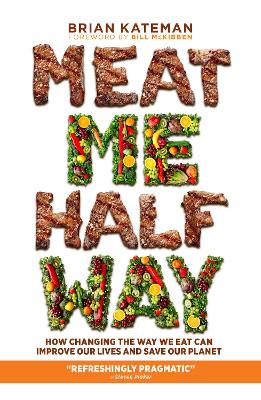We know that eating animals is bad for the planet and bad for our health, and yet we do it anyway. We’ve all heard the statistics: animal agriculture is responsible for at least 18 percent of all greenhouse gas emissions; we need to drop our meat consumption by 50 percent simply to feed the world’s estimated 10 billion people in 2050; a full third of the Earth’s arable land is devoted to growing crops for livestock; approximately 80 percent of deforested land in the Amazon is used solely for rearing livestock. Ask anyone in the plant-based movement and the solution seems obvious: Stop eating meat.
But for many people, that stark solution is neither appealing nor practical. In Meat Me Halfway, author and founder of the reducetarian movement Brian Kateman puts forth a realistic and balanced goal: mindfully reduce your meat consumption. It might seem strange for a leader of the plant-based movement to say, but meat is here to stay. The question is not how to ween society off meat, but how to make meat more healthy, more humane, and more sustainable.
In this book, Kateman answers the question that has plagued vegans for years: why are we so resistant to changing the way we eat, and what can we do about it?
Exploring our historical relationship with meat, from the domestication of animals, to the early industrialization of meatpacking, to the advent of the one-stop grocery store, the science of taste, and the laws that impact our access to food, Meat Me Halfway reveals how humans have evolved as meat eaters. Featuring interviews with pioneers in the science of meat alternatives, investigations into new types of farming designed to lessen environmental impact, and innovations in ethical and sustainable agriculture, this down-to-Earth book shows that we all can change the way we create and consume food.
- ISBN10 163388791X
- ISBN13 9781633887916
- Publish Date 22 June 2022 (first published 22 April 2022)
- Publish Status Active
- Publish Country US
- Imprint Prometheus Books
- Format Hardcover
- Pages 248
- Language English
